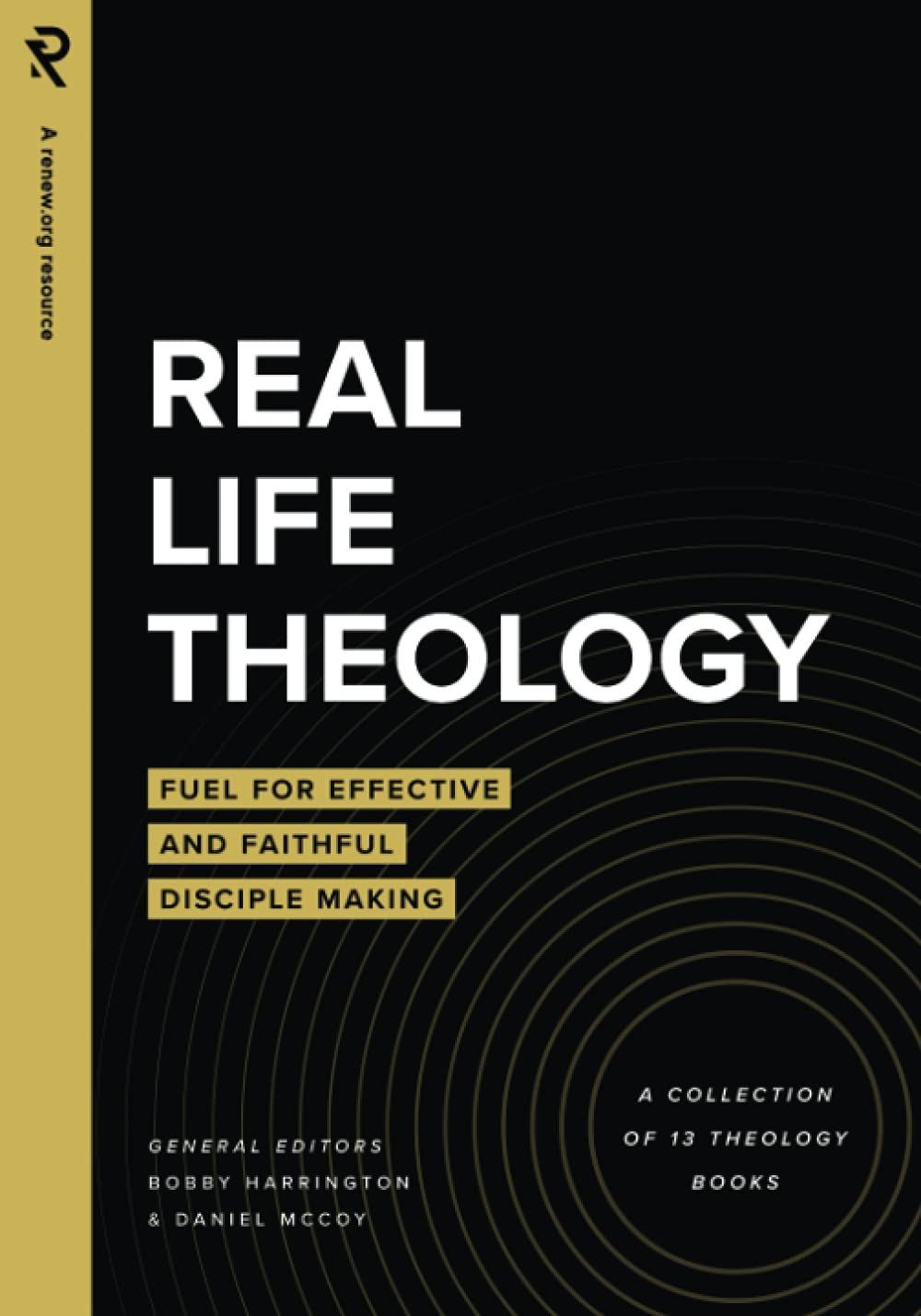What is it?
An eight session training course in theology that emphasizes practical application in real life for relational disciple making.
You will read and reflect on 8 of the topics in the Renew Network’s
Real Life Theology collection prior to monthly meetings where you will discuss the content and practice sharing it with others. The goal is to be able to articulate what the Bible teaches about a respective issue and how it changes your life and helps you as a disciple maker.
Biblical Truth
Practical Application
Small Group Support
Food Provided
The eight books featured are:
1. Grand Metanarrative: God’s Story as an Invitation to Theology
2. God’s Word: The Inspiration and Authority of Scripture
3. The Gospel Precisely: Surprisingly Good News About Jesus Christ the King
4. New Birth: Conversion and Baptism
5. Kingdom Life: Experiencing God’s Reign Through Love and Holiness
6. Holy Spirit: Filled, Empowered, and Led
7. Countercultural Living: What Jesus Has to Say About Life, Marriage, Race, Gender, and Materialism
8. The End: The Return of King Jesus and the Renewal of All Things
Session Times
Sessions take place on the second weekend of the month after the Saturday 5pm or Sunday 11:15am services.
What is Provided?
Dinner (for Saturday session) and lunch (for Sunday session) are provided, along with childcare.
Expectations
Homework each month includes reading the next book (1-3 hours) and selecting the top few scriptures you would want to make sure you share if someone were to ask about it.
Why does Real Life Theology Matter?
Subjective instincts, feelings, assumptions, or cultural norms can lead us astray. Thankfully, we have the Bible to instruct and guide us. This collection of writings teaches us theological truth, but its ultimate purpose is not just to teach us information, it’s to equip us.
All Scripture is God-breathed and is useful for teaching, rebuking, correcting and training in righteousness, so that the servant of God may be thoroughly equipped for every good work.
- 2 Timothy 3:16-17
The Apostle Paul explains to his protege, Timothy, how some people were teaching false doctrines and focusing on controversial speculations instead of advancing God’s work (1 Timothy 1:3-4). He explains how right beliefs are meant to produce an inner life change resulting in love not just intellectual knowledge:
The aim of our charge is
love that issues from a pure heart and a good conscience and a sincere faith. - I Timothy 1:5
This focus on a godly life flowing from good doctrine is reiterated throughout the New Testament letters:
I appeal to you, brothers, to watch out for those who cause divisions and create obstacles contrary to the doctrine that you have been taught; avoid them. - Romans 16:17
…so that we may no longer be children, tossed to and fro by the waves and carried about by every wind of doctrine, by human cunning, by craftiness in deceitful schemes. - Ephesians 4:14
If you put these things before the brothers, you will be a good servant of Christ Jesus, being trained in the words of the faith and of the good doctrine that you have followed. - I Timothy 4:6
If anyone teaches a different doctrine and does not agree with the sound words of our Lord Jesus Christ and the teaching that accords with godliness… - Timothy 6:3
He must hold firm to the trustworthy word as taught, so that he may be able to give instruction in sound doctrine and also to rebuke those who contradict it. -Titus 1:9
After his resurrection, Jesus made clear the authority and power of the word of God (the Hebrew “Old” Testament at the time) to produce repentance (Luke 24:44-47). Jesus’ ongoing struggle with the religious leaders often related to their self-assumed knowledge of Scripture but failure to apply it in their own lives (Matthew 23). Prior to Jesus, this was the long-standing struggle of the Hebrew prophets - helping the Israelites wake up to their disobedience to God’s revealed will.
There has always been a human tendency to question God and pick what we want to believe (see Genesis 3 for the first instance). False doctrine was rampant in New Testament times, and Jesus, Peter, and John tell us it will continue (Matthew 7:15;
2 Peter 2:1;
1 John 4:1). Paul refers to people with “itching ears” gathering around themselves teachers who say what satisfies their desires (2 Timothy 4:3).
We shouldn’t be surprised that it’s no different today. Additionally, the contemporary evangelical church in America seems to be experiencing a fast-growing shift that lowers the Bible’s authority to base decisions on human feelings. This has been referred to as
“Progressivism.”
How are we addressing this issue?
Two important strategies to ground people in biblical truth are 1) reinforcing the inspiration, authority, and power of Scripture to change our lives and 2) cultivating regular habits of reading, reflecting on, and obeying Scripture (individually and in community).
To proactively train up and develop strong disciples of Jesus to join God in restoring a broken world, we want to provide more formal content, tools, and accountability. This includes
1) the promotion of the Discovery Bible Study method of learning and obeying Scripture, and 2) the Real Life Theology training program.



